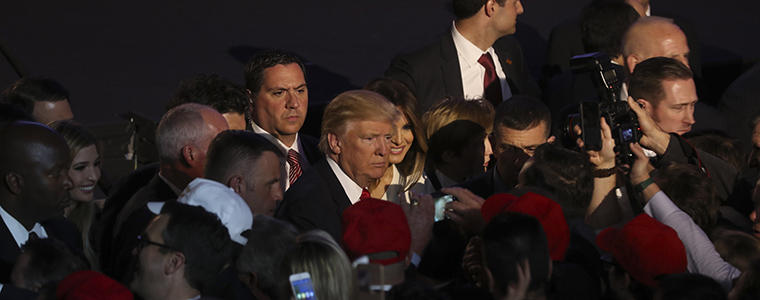American, Pakistani Former Officials on ‘Most Likely Scenarios’
As the United States prepares for a transition to a President Donald Trump administration, what might be the future of America’s relationship with Pakistan? U.S.-Pakistani relations got little attention in the U.S. presidential election campaign, but four former senior U.S. and Pakistani officials offered what they said were likely scenarios November 16 in a forum at USIP. All four acknowledged past tensions in the relationship. Looking ahead, they cautioned against any deep rupture. “For the future, it’s important to stay engaged,” said Robin Raphel, who served as the first U.S. assistant secretary of state for South and Central Asia.

The former officials spoke in a discussion of the role played by the two countries’ policies on U.S. aid to Pakistan, which has averaged $2 billion annually in recent years.
To a question from USIP’s Moeed Yusuf, the former officials discussed possible directions—best, worst and most likely—for U.S.-Pakistani relations following the change in U.S. administrations. Their points included these:
Lisa Curtis, former U.S. diplomat and senior State Department adviser. “You’ll continue to see [U.S.] security assistance decline, unless we have some changes in Pakistan’s policy,” including arrests and prosecutions of terrorists, said Curtis, now a fellow at the Heritage Foundation who researches South Asian affairs. A decline in relations could be averted, she said, “if you had denial of free movement” of Afghan Taliban within Pakistan, and Pakistani pressure that brought Taliban leaders “to the negotiating table. This would be, I think, very helpful for the overall U.S.-Pakistan relationship.”
Hussain Haqqani, former Pakistani ambassador. “Most likely scenario, we will have, of course, curbs on immigration from Pakistan. Aid will decline, and there will be some reaction in Pakistan,” said Haqqani, the director for South and Central Asia at the Hudson Institute. “I hope that it is measured so that it doesn’t provoke another reaction cycle here.”
Robin Raphel, former U.S. assistant secretary of state. “Most likely scenario, I think, is that the new administration will have a re-look and will tighten up, harden up on the issues” such as the Afghan Taliban’s use of Pakistan as a safe haven, said Raphel, who served as a coordinator of U.S. non-military aid to Pakistan. “And that Pakistan will probably, at least in the short term, pull up its socks, as we say, and … accelerate plans that it might have to deal with some of these groups.”
Ishrat Husain, former governor of the State Bank of Pakistan. “If this administration de-hyphenates Pakistan from Afghanistan that will become a more enduring and positive relationship for Pakistan and the United States,” said Husain, currently a public policy fellow at the Woodrow Wilson Center. “But if you continue to have nuclear, Afghanistan, terrorism,… jihadis” at the center of the U.S. focus, “dialogue will continue and we will muddle through.”
The analysts also discussed alternative “best” and “worst” scenarios for the countries’ near-term relations. Curtis and Haqqani agreed that the best would be what Curtis called “Pakistan cracking down on the Taliban and all terrorist groups within its borders” and a “comprehensive approach” to regional security, and “seeking dialogue with India and with Afghanistan.” Haqqani urged Pakistan to take that approach because “we need to change Pakistan for the better for our own sake, not because America wants us to, but because … we need to get rid of the jihadis and we need to get on better with India.”
The worst prospect, Curtis and Haqqani said, would be a major terrorist attack in the United States that was found to have its roots in one or another of Pakistan’s militant networks. In such a case, Haqqani said, the message from the United States, including President Barack Obama, has been that “all bets are off.”
Raphel discussed the possibility that the Islamic State (ISIS) militant group, present mainly in Iraq and Syria, could develop stronger affiliates in Afghanistan, where an ISIS group has emerged, or in Pakistan. In such a case, “if the administration does what candidate Trump had suggested, … you could have another period of an increase in military assistance to Pakistan,” Raphel said
Yusuf urged both Pakistani and U.S. policymakers to “take a day off from work … and put yourself squarely in the other’s shoes. And then decide if there are convergences that you can work on.” Given that “all of us agree that a rupture is not in the interests of both sides, maybe that’s one way forward—to really become the other side for a day,” said Yusuf, who is associate vice president at USIP.